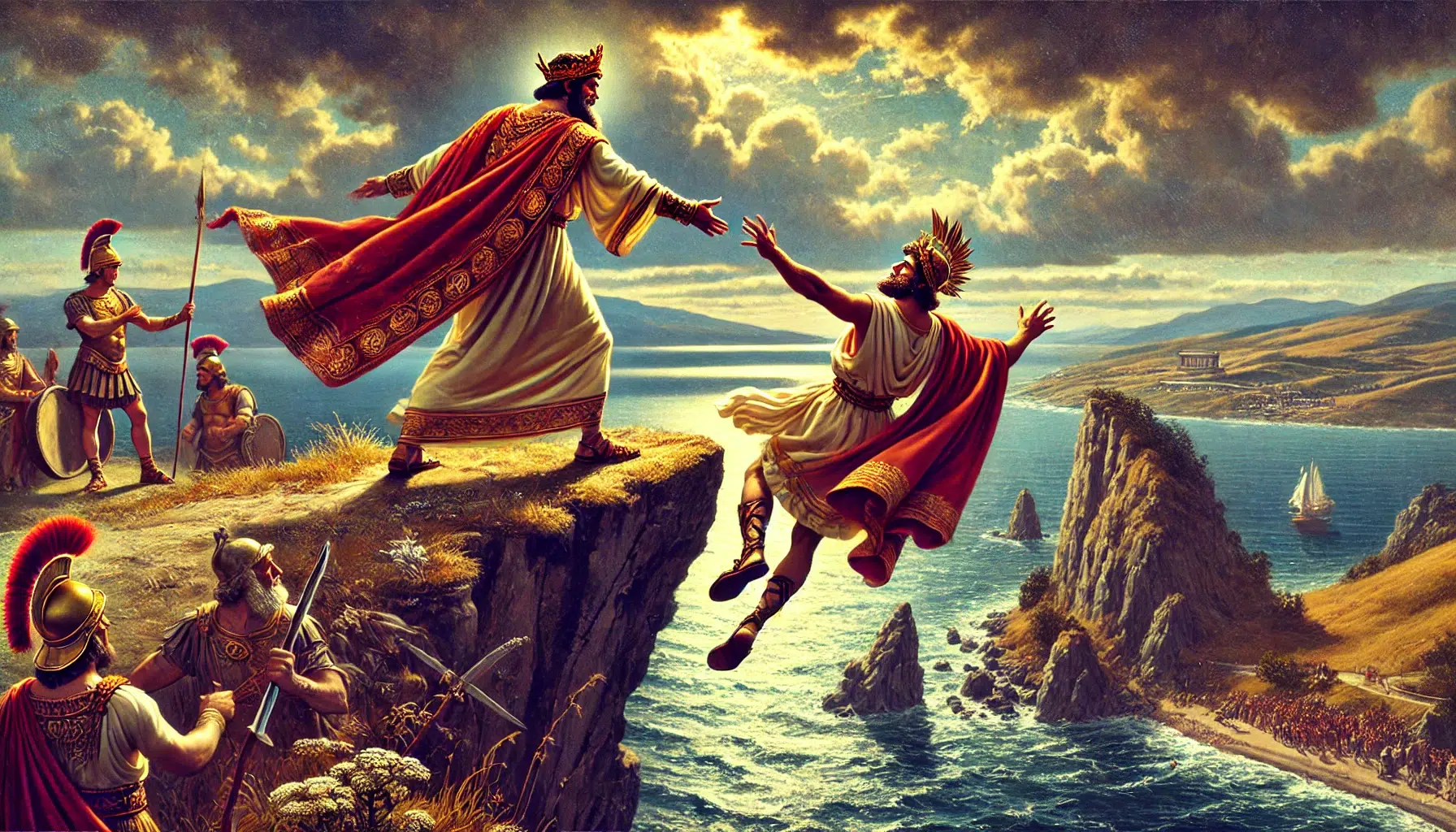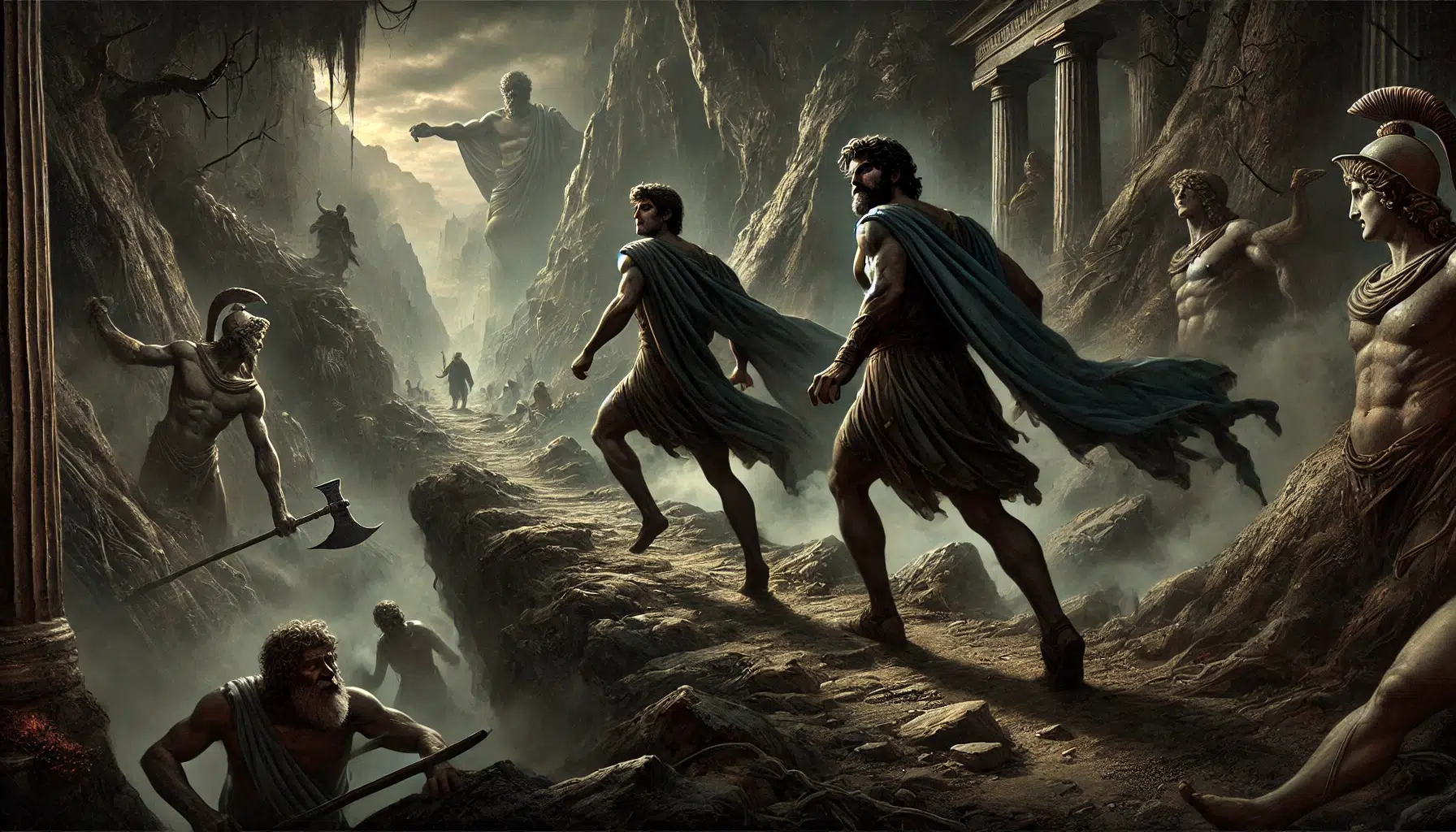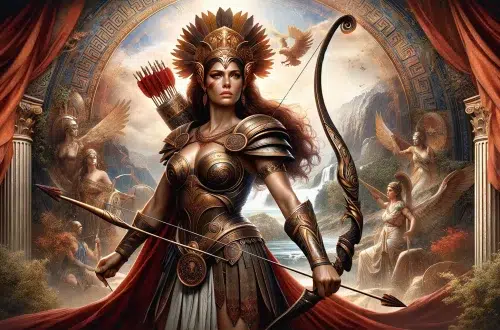
Minotaur and Theseus: King, Hero and a Tragic Death
The Minotaur and Theseus myth isn’t just exciting but has deep meanings with the labyrinth symbolizing hard twists and turns of life.
Theseus, a beloved hero in Greek mythology, is known for his courage and intelligence. His father was Aegeus, the King of Athens, and he might have been the son of Poseidon, the god of the sea. This background led him to many great adventures.
Who is Theseus?
Theseus was famous for defeating bandits and monsters in Greek mythology. These exploits made him a legendary figure in ancient stories.
Theseus is remembered as a hero in ancient Greece known for his bravery and smart thinking. In Athens, his stories are a big part of their culture and myths.
Theseus didn’t start as a king or a god. He has exciting adventures that people have loved for thousands of years. He wasn’t just strong, like Hercules, or clever, like Perseus. Theseus was both.
His stories teach us about ancient Greek values. They show the power of thinking ahead and leading. By looking at his life, we see how Athens was influenced. Through his tales, Theseus continues to inspire us today.
The Early Life and Birth of Theseus

Theseus’s birth mixes mystery with a divine background. Theseus had an interesting early life. His mother, Aethra, was a princess from Troezen. His father was either Aegeus, the king of Athens, or Poseidon, the sea god. This shows Greek myths‘ mix of human and divine elements.
He was born in Troezen, raised by his mother Aethra.
Aethra becomes pregnant after a night with both Aegeus and Poseidon. This unique birth links Theseus to both a king’s heritage and a god’s power. Aegeus visits Troezen after consulting the Oracle at Delphi. He leaves a sword and sandals under a large stone for his future son to find as a way of revealing his identity.
In Troezen, Theseus grows up not knowing his dad. When he became an adult, he would later find these symbols.
Foretelling his heroism, seers predict Theseus would be a great hero. Aethra shapes him for this fate. These early signs set the path for Theseus’s epic adventures.
Theseus would journey and face many challenges. His journey shows his bravery and strength. He keep the iron club from Periphetes as a symbol of his victory. Theseus’s early life prepared him for his future adventures and his role as a great hero.
Symbols for Theseus
Sword: Aegeus, Theseus’s father, hides a sword under a large rock before Theseus is born. This sword symbolizes Theseus’s royal heritage and future as a hero. Theseus eventually goes to the rock with his mother. There he lifts the rock and takes the sword. He proves his strength and readiness to claim his place in Athens.
Sandals: Along with the sword, Aegeus also leaves a pair of sandals under the rock. These sandals represent Theseus’s journey and rightful path to his father, Aegeus, in Athens.
These symbols highlight Theseus’s strength, bravery, and rightful claim to his heritage. They also mark important milestones in his journey to becoming a hero.
Theseus’s Journey to Athens

The tale of Theseus heading to Athens is a legendary story from ancient Greece. He could have taken the sea route, which was safer. Instead, he chooses the risky path on land, facing many dangers. By taking this path, he shows his bravery and his commitment to protecting others.
Theseus faces tough challenges along the way. By defeating them, he not only defends himself but also helps the innocent from these terrible men.
Every time Theseus wins a battle, people heard about it. They start to think of him as a true hero. His journey is seen as the start of his legend. This adventure marked the beginning of his role as a saviour and a symbol of fairness, making him later revered in Athens.
The Challenges Theseus Encounters Along the Way

He decides to travel to Athens by land, despite warnings about dangerous bandits and monsters. He wants to prove his bravery and strength.
Periphetes (Club Bearer)
His first encounter is with Periphetes, known as the Club Bearer. Periphetes attacks travelers with a bronze club. He tricks him into showing the club, then uses it to defeat him. Theseus keeps the club as a symbol of his victory.
Sinis (Pine Bender)
Next, Theseus meets Sinis, the Pine Bender. Sinis ties people to bent pine trees and releases them, tearing them apart. He captures Sinis and uses his own method against him, tying him to the trees and letting them snap back. This ends Sinis’s reign of terror.
The Crommyonian Sow
Continuing his journey, Theseus faces the Crommyonian Sow, a monstrous pig (or a female bandit) terrorizing the area around Crommyon. Theseus bravely confronts and kills the beast, protecting the local people. This act shows his courage and strength.
Sciron
Further along the road, Theseus encounters Sciron, a bandit who forces travelers to wash his feet. While they are distracted, Sciron kicks them off a cliff to be eaten by a sea monster, or turtles. He tricks Sciron into washing his own feet and then throws him off the cliff, where the sea monster devours him.
Cercyon
Near Eleusis, Theseus meets Cercyon, a cruel king who challenges travelers to deadly wrestling matches. Cercyon kills anyone who loses. Theseus uses his skill and strength to defeat Cercyon, lifting him and smashing him to the ground. This victory frees the people from Cercyon’s tyranny.
Procrustes
Finally, he encounters Procrustes, a sadistic bandit with an iron bed. Procrustes forces travelers to fit the bed by stretching them or cutting off their limbs. Theseus overpowers Procrustes and uses his own method against him, making Procrustes fit the bed.
Arrival Back in Athens

The journey of Theseus to Athens likely takes several weeks or even months, considering the numerous encounters and battles he faces along the way. Each encounter requires time and effort, making the journey long and arduous.
The challenges he overcomes indicate a significant passage of time.
Medea and the Reunion with Aegeus
When Theseus arrives in Athens, he does not reveal his true identity immediately.
King Aegeus, his father, is married to Medea, a powerful sorceress. Medea recognizes Theseus as Aegeus’s son and fears he will take her son’s place as heir.
She tries to poison Theseus during a banquet. However, Aegeus notices the sword Theseus carries, the same sword he left under the rock for his son. Realizing Theseus is his son, Aegeus stops him from drinking the poison.
Medea’s plan fails, and she flees Athens. This recognition by Medea marks the beginning of Theseus’s acceptance in Athens.
After recognizing Theseus, Aegeus embraces him as his son.
This reunion is emotional and significant for both father and son. Aegeus, who has longed for an heir, is overjoyed to find his son alive and strong. Theseus, having proven his bravery on his journey, feels proud to be acknowledged by his father.
The people of Athens also celebrate this reunion, as it brings hope and stability to the kingdom. Aegeus declares Theseus his heir, solidifying his position in Athens. This reunion strengthens the bond between father and son and sets the stage for his future adventures.
Defeat of the Marathonian Bull

To prove his worth further, Theseus accepts the challenge to capture the Marathonian Bull.
This bull has been terrorizing the region of Marathon. The beast escapes from Crete and causes chaos in Marathon. People are afraid, and they hope for someone to save them.
Theseus bravely confronts the bull, using his strength and skill to subdue it. He brings the captured bull back to Athens, showcasing his heroism. The people of Athens admire Theseus for his bravery and strength.
This victory over the bull solidifies Theseus’s reputation as a hero. It also demonstrates his commitment to protecting Athens and its people. The defeat of the Marathonian Bull is a significant achievement in Theseus’s journey, earning him respect and admiration from all.
The bull came from Crete, a place with rich Greek myths. Heracles, the famous hero, had also dealt with this bull before. This connection made his achievement even more celebrated throughout Greece. It underlined why he is truly known as an exceptional Athenian hero.
The Minotaur and Theseus Myth

One of the most thrilling stories about Theseus is his battle in the labyrinth with the Minotaur.
The labyrinth was built to keep the Minotaur, a half-man half-bull, captive. King Minos of Crete orders this to stop anyone from trying to free the Minotaur.
The story of the labyrinth and the Minotaur isn’t just exciting. It also has deep meanings. The labyrinth is like a symbol for the hard twists and turns of life.
The Minotaur stands for the big challenges we face, both inside and outside ourselves. This story from ancient Greece still fascinates people today. It teaches us about bravery and smart planning.
The Minotaur and Theseus – King Minos and Journey to Crete
Athens must pay a terrible tribute to King Minos of Crete.
Every nine years, the city sends seven young men and seven young women to Crete. These youths face a horrifying fate. They become food for the Minotaur, a monstrous creature with the body of a man and the head of a bull.
This tribute is a punishment for the death of Minos’s son, Androgeus, who died in Athens. The people of Athens live in fear and sorrow because of this cruel demand.
Theseus, the brave prince of Athens, volunteers to be one of the tributes.
He wants to end this terrible practice and kill the Minotaur. Before leaving, he promises his father, King Aegeus, to change the ship’s sails from black to white if he returns victorious.
He and the other tributes set sail for Crete, knowing the dangers that await them. The journey is filled with tension and fear, but Theseus remains determined to succeed.
The Minotaur and Theseus – Ariadne and Slaying the Minotaur
Upon arriving in Crete, Theseus meets Ariadne, the daughter of King Minos.
Ariadne falls in love with Theseus and decides to help him. She gives him a ball of thread, known as Ariadne’s thread, and a sword.
Ariadne instructs Theseus to tie one end of the thread to the entrance of the Labyrinth and unravel it as he goes deeper inside. This way, he can find his way back after killing the Minotaur. This thread is a clever way for him to find his way back out of the complicated labyrinth after defeating the Minotaur. Theseus gratefully accepts her help, knowing it is his best chance for success.
Theseus enters the Labyrinth, a complex maze designed by the architect Daedalus. He follows Ariadne’s instructions, using the thread to mark his path. Deep within the Labyrinth, Theseus encounters the Minotaur.
A fierce battle ensues, but Theseus fights bravely and manages to kill the beast with the sword given by Ariadne. Victorious, he follows the thread back to the entrance, leading the other tributes to safety.
Return to Athens and the Black Sail Incident

Theseus and the rescued youths set sail for Athens, taking Ariadne with them. However, they stop at the island of Naxos, where Theseus abandons Ariadne.
Different versions of the myth offer various reasons for this abandonment. Distraught over leaving Ariadne, Theseus forgets to change the ship’s sails from black to white.
King Aegeus, waiting anxiously for his son’s return, sees the black sails and believes Theseus is dead. Overcome with grief, Aegeus throws himself into the sea, which is later named the Aegean Sea in his memory. Theseus returns to Athens as a hero but mourns the loss of his father.
Theseus’s Role in Athenian Politics
Theseus becomes the King of Athens and is praised for his wise and just rule. He cares more about his people’s well-being and unity than gaining more power. He changes Athenian society a lot, using new ideas and kind leadership.
One key thing he did was to make Athens more democratic. He wants a fairer society, so he makes policies that let more people help make decisions. This makes Athens stronger and taught its citizens about democratic values.
Also, Theseus unifies Attica through Synoikismos. Before him, Attica was many separate places that didn’t work well together. With Synoikismos, Theseus joins these places into one, making Athens prosperous and united. This makes Athens stronger politically and culturally, leading to its success later on.
Further Adventures and Myths of Theseus
Theseus Among the Amazons

One of the most captivating stories in Greek myths is how Theseus helps Heracles fight the Amazons.
Theseus engages in a fierce battle with the Amazons, a race of warrior women. They were known for their strong leadership and fighting skills.
The conflict, known as the Attic War, begins when Theseus abducts Antiope, an Amazon queen. Theseus would marry their queen, Antiope, with whom he has a son, Hippolytus.
In response to the abduction, the Amazons invade Athens to rescue her. They camp within the city, showing their strength and determination.
Both sides hesitate to attack for a long time. Finally, he sacrifices to Phobos, the god of fear, and leads an attack. The battle is intense, with both sides showing great bravery. In some versions, Antiope dies protecting her family.
The Athenians eventually push the Amazons back, and a peace treaty is made.
Euripides Play: Hippolytus
Other versions of the myth suggest that Theseus abducted Hippolyta, Antiope’s sister. Or she even ran away with him to Athens after falling in love with him.
Euripides wrote a play Hippolytus and in that version he states that Theseus ran off with an Amazon Queen. The play suggests that Hippolyta would marry Theseus and have their son, Hippolytus.
There’s further confusion in the myth of Hercules 12 Labors. In the 9th Labor, Hippolyta’s Girdle, some versions have Hercules killing Hippolyta to secure the belt.
Friendship with Pirithous and the Abduction of Helen
Theseus and Pirithous form a strong bond of friendship after an unusual encounter.
Pirithous, the king of the Lapiths, hears about Theseus’s bravery and strength and wants to test him. He steals Theseus’s cattle, expecting a confrontation. When Theseus pursues him, they meet and prepare to fight. However, instead of battling, they admire each other’s courage and decide to become friends.
This friendship grows deep, and they become inseparable, sharing many adventures.
One of their most daring plans involves abducting daughters of Zeus.
Theseus chooses Helen, the beautiful princess of Sparta, while Pirithous sets his sights on Persephone, the queen of the Underworld. Together, they kidnap Helen, who is very young at the time. Theseus leaves her with his mother, Aethra, for safekeeping.
This act angers Helen’s brothers, Castor and Pollux, who later invade Athens to rescue her. They also capture Aethra as revenge.
Theseus and the Underworld
Encouraged by their success with Helen, Theseus and Pirithous embark on a dangerous mission to the Underworld to abduct Persephone.
They believe their divine parentage gives them the right to marry daughters of gods.
However, Hades, the ruler of the Underworld, tricks them.
He invites them to a feast and traps them with magical chairs that bind them. Theseus and Pirithous cannot escape and remain trapped in the Underworld.
Heracles, another great hero, eventually rescues Theseus during his twelfth labor.
However, he cannot free Pirithous because the earth shakes violently when he tries. Pirithous remains in the Underworld as punishment for his audacious attempt to kidnap Persephone.
Theseus returns to Athens, only to find that his city has suffered because of his actions. The Dioscuri have taken Helen back to Sparta and captured Aethra.
Theseus’s friendship with Pirithous leads to bold adventures but also brings significant consequences. Their bond and daring deeds become legendary, showcasing their bravery and loyalty to each other.
Involvement in the Calydonian Boar Hunt and the Argonauts’ Expedition
Theseus participates in the Calydonian Boar Hunt, one of the great heroic adventures.
King Oeneus of Calydon forgets to honour Artemis, who sends a monstrous boar to ravage the land.
Meleager, the leader of the hunt, gathers many heroes, including Theseus. They face the ferocious boar, which destroys crops and endangers people.
Atalanta, a skilled huntress, wounds the boar first, and Meleager delivers the killing blow. Theseus’s involvement in the hunt demonstrates his bravery and skill. He also joins the Argonauts’ expedition, led by Jason, to retrieve the Golden Fleece.
Although his role is not prominent, Theseus’s participation in these adventures shows his commitment to heroic deeds and his place among Greece’s greatest heroes.
The Tragedy of Phaedra and Hippolytus

After marrying Phaedra, Theseus’s life takes a tragic turn. Theseus marries Phaedra, the daughter of King Minos of Crete, they have two sons, Acamas and Demophon.
Phaedra falls in love with her stepson, Hippolytus, Theseus’s son from a previous relationship with either Antiope (or Hippolyta). This forbidden love, often attributed to a curse from Aphrodite, leads to a series of tragic events.
Phaedra’s love for Hippolytus is intense and forbidden. According to some versions, this love is a curse from Aphrodite, the goddess of love, who is angry at Hippolytus for neglecting her in favour of Artemis, the goddess of chastity and the hunt. Phaedra struggles with her feelings, knowing they are wrong, but she cannot control her passion.
Phaedra confesses her love to Hippolytus. Devoted to Artemis and committed to chastity, Hippolytus rejects Phaedra’s advances. He is horrified by her confession of love and maintains his loyalty to Artemis. This rejection devastates Phaedra, who feels humiliated and desperate.
Humiliated and desperate, Phaedra decides to take her own life but leaves a note falsely accusing Hippolytus of trying to rape her. She hopes this will protect her honour and ensure her sons’ future. He finds the note and, believing Phaedra’s accusation, becomes enraged.
Theseus, furious and heartbroken, uses one of the three wishes granted to him by Poseidon to curse Hippolytus.
He asks Poseidon to kill his son. Poseidon sends a sea monster that frightens Hippolytus’s horses, causing a fatal accident. Hippolytus is dragged to his death by his chariot.
After Hippolytus’s death, Artemis reveals the truth to Theseus. She tells him that Phaedra’s accusation was false and that Hippolytus was innocent. Theseus is devastated by the loss of his son and the realization of Phaedra’s deceit. Phaedra’s tragic love and Hippolytus’s untimely death leave a lasting impact on Theseus.
The Tragic Death of Theseus

Theseus, once a Greek hero at the top, faces decline in his later years.
Uprising led by Menestheus
Menestheus stirs up trouble in Athens. He convinces the nobles and common people that Theseus has taken away their freedoms. Menestheus claims Theseus has centralized power and treats everyone as subjects rather than equals.
This discontent grows, especially during Theseus’s absence. Menestheus uses this opportunity to lead a rebellion against Theseus. The people, influenced by Menestheus’s words, turn against Theseus. They blame him for their misfortunes and support Menestheus as their new leader. Theseus finds himself without support and unable to quell the uprising.
Exile to Scyros
With the rebellion in full swing, Theseus decides to leave Athens. He sends his children to Euboea for safety. Theseus then sails to the island of Scyros, seeking refuge with King Lycomedes.
He hopes to find safety and perhaps plan his return. However, the people of Scyros treat Theseus with great honour, which makes Lycomedes suspicious.
Lycomedes fears that Theseus might try to take over his kingdom. Theseus, unaware of Lycomedes’s intentions, remains on the island, hoping for a chance to regain his throne.
Death at the Hands of Lycomedes
King Lycomedes decides to eliminate the threat Theseus poses. He invites him for a walk to a high cliff, pretending to show him the island’s beauty. As they reach the edge, Lycomedes suddenly pushes Theseus off the cliff.
Theseus falls to his death, ending his life in exile. This treacherous act ensures that Lycomedes remains in power without the threat of Theseus.
Later, the Athenians, realizing their mistake, honour Theseus as a hero. They retrieve his bones and bring them back to Athens, giving him a proper burial.
Theseus’s life ends tragically, but his legacy as a great hero and king endures.
Legacy and Cultural Impact of Theseus
Theseus’s story has been a beacon of heroism for many centuries. He symbolizes the best of Athens, bringing people together with his bravery and unity. His story inspired Athenians in both tough and calm times.
His impact on culture is huge, touching areas like art, theater, and literature. Artists loved showing his courageous acts, making him a model. Playwrights such as Euripides and Sophocles told his stories in ways that kept them alive for future generations. These works made him an icon of Athens.
But Theseus’s reach goes beyond Greece. His heroic traits made him a model for many Western heroes. His tales are loved for their themes of courage, smarts, and the victory of good. Even today, people find inspiration in his adventures.
Conclusion
Theseus’s story is among the top myths in Greek history.
It highlights both a hero’s adventure and key moral lessons from ancient Greece. His tale starts with a mysterious birth and includes major feats like defeating the Minotaur. Both old and new stories show the bravery, wisdom, and deep character of Theseus. He stands as a figure who leads by example even today.
Themes of courage, sacrifice, and the fight for fairness are key in Theseus’s myth. They still grab people’s attention all over the world. These myths help us learn about ourselves and the lifelong battle of right versus wrong. They also show how myths continue to teach us and guide our culture and values from the past to today.
Theseus’s adventures are a rich bed of ideas for stories in many forms. They have and are still inspiring works of literature, painting, movies, and plays. This shows the profound impact of his story. By exploring his tale, we learn the depth of Greek myths. We also see the timeless power of his journey, which has the ability to touch hearts and minds through time.





